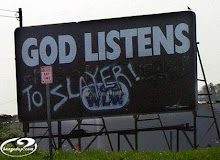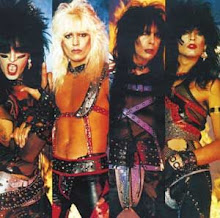Monday, October 29, 2007
Wednesday, October 10, 2007
Anthem- Finished
[I really wish I hadn't procrastinated doing this blog for so long. I picked the quote and by the time I turned the books back in I forgot a lot of the details of the story, so I hope this quote analysis is sufficient enough considering I forgot said details a month ago.]
"Many words have been granted me, and some are wise, and some are false, but only three are holy: 'I will it!'" (94-95)
"Many words have been granted me, and some are wise, and some are false, but only three are holy: 'I will it!'" (94-95)
Quote/ Theme Analysis:
This quote expresses the significance of personal freedom and decisions in Anthem. The main character (I really can't think of their [his?] name at the moment), has finally come to realize that he in fact can think for himself, contradicting the goal of this dystopian society in the first place. This has been a common theme in several of the utopian/dystopian books we have read so far this year. In Fahrenheit 451, Anthem, We, and The Handmaid's Tale, the main character is distinguished from the rest of the society by one central factor: their ability to transcend the rules and structures of the robotic societies in which they live. Although knowledge and the ability to recognize what is real and what is not is important to the main character of Anthem, what is more important is being able to decide for oneself how to learn, what to think, and how to live without restrictions and oppressions of the "utopian" society that is intended to eliminate these necessities of thought.
This quote expresses the significance of personal freedom and decisions in Anthem. The main character (I really can't think of their [his?] name at the moment), has finally come to realize that he in fact can think for himself, contradicting the goal of this dystopian society in the first place. This has been a common theme in several of the utopian/dystopian books we have read so far this year. In Fahrenheit 451, Anthem, We, and The Handmaid's Tale, the main character is distinguished from the rest of the society by one central factor: their ability to transcend the rules and structures of the robotic societies in which they live. Although knowledge and the ability to recognize what is real and what is not is important to the main character of Anthem, what is more important is being able to decide for oneself how to learn, what to think, and how to live without restrictions and oppressions of the "utopian" society that is intended to eliminate these necessities of thought.
Reflection:
Well, I definitely enjoyed the simplicity of this novel in comparison to We. I find that I enjoy books more when I can actually fully understand the story and be able to analyze it without having to work around complex sentences and unclear plots, because at that point all I am doing is trying to figure out what the author is trying to say, and it takes away from the meaning of the story. Although the style was very different from any book I've ever read before (the main character(s?) referring to themselves in the plural, as a unit) and this concept was a little confusing to begin with, I ended up liking how the author used this "unit" of people to refer to a single character as it emphasized the absence of individuality in so-called "utopian" societies.
We- Finished
"For every equation, every formula in the superficial world, there is a corresponding curve or solid. For irrational formulas, for my [square root of] -1, we know of no corresponding solids, we've never seen them... But that's just the whole horror-- that these solids, invisible, exist. They absolutely inescapably must exist" (98).
Analysis of Quote-
This quote describes the mathematically robotic society in which the people live in We. Its members are so accustomed to this lifestyle that anything outside it that cannot be solved mathematically is appalling and something that they absolutely cannot stand to think about. The only way to think about these types of irrational mathematical concepts is by possessing at least somewhat of an imagination, an ability to think about the things that cannot be seen, things that do not exist in the physical world. This horrible feeling that D-503 has toward mathematical illogic almost seems to foreshadow the end of the novel when he is brainwashed of all imagination and thoughts that are forbidden in this dystopian society. Without imagination, he cannot know the difference between logic and illogic since illogic cannot exist without imagination.
Analysis of Symbol- The Benefactor and OneState
Zamyatin's descriptions of OneState and the Benefactor can be connected to the principles of communism. Living in communist Russia, this was likely a major influence on Zamyatin's writing of We. In a communist society, every citizen is intended to be equal, and therefore the work that they do and the things that they accomplish mean nothing in the eyes of the society. This is the same concept found in We as well as most other dystopian novels. Both communism and utopian societies are founded with the intention that they will create a "perfect" society free of social inequality and necessity, when in reality, neither one can actually exist in the real world. Instead, the people in the society are oppressed, not allowed to think or create anything for themselves, trivializing their existence as human beings.
Reflection-
As far as all the books we have read in class so far this year, I would definitely say that We was my least favorite. The language (most likely since it was translated from the original Russian novel to English) made it difficult to focus on and sitting down and trying to concentrate on actually reading it was a painful experience. I especially didn't like the use of unfinished sentences and thoughts in the novel. Not only did it make it more difficult to actually read and understand the book, but these unfinished thoughts were never revisited. I also thought the ending was very disappointing. Even though I didn't enjoy the book at all, I believe the ending could have been much better than it was written to be. The rest of the story, especially with all the unfinished thoughts, left a lot to be discovered for a good ending, and the only thing that happened was D-503 being brainwashed and having his imagination removed, something that one expects to find in dystopian stories to begin with, since this brainwashing is ultimately how these types of societies come to exist in novels in the first place. If nothing else, I would have liked to see more of an explanation and more closure from D-503 in the ending.
Subscribe to:
Posts (Atom)

